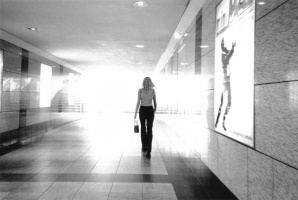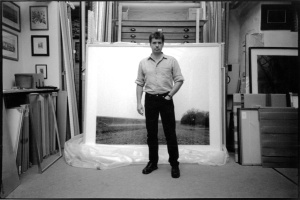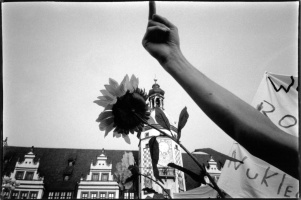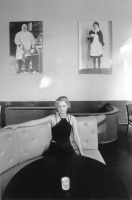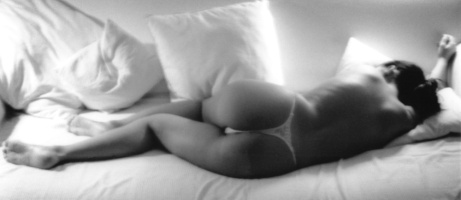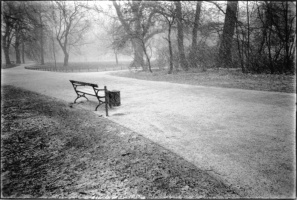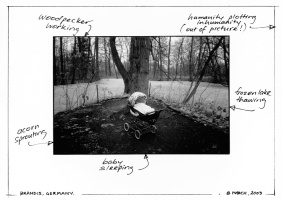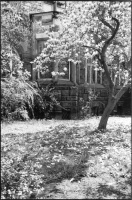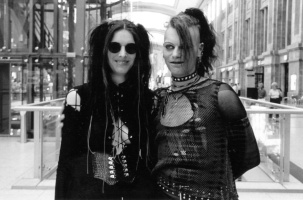




Feb 2003
"Writing is easy; all you do is sit staring at a blank sheet of paper until the drops of blood form on your forehead" according to Gene Fowler.
Thanks mate! Itīs deep Winter and Iīm stuck in a tiny mining town near the border to Poland which maybe would have inspired George Orwell, but...! Itīs so cold here I think my blood has frozen solid.
I wanted to write something about photography (for a change), but thereīs not much of personal note to tell you. Instead Iīd like to refer your attention to the book Susan Sontag wrote about 30 years ago "On Photography". She attempted to analyse the point or the power of photography - and did exceedingly well, so much so that it has become essential reading, and is worth re-reading. But she has revisited the subject in a forthcoming book, and her insight is just as sharp, but this time she has revised her opinion - and itīs depressing!
I found myself in a tirade about the same problem shortly before running across her comments that almost NO ONE is producing images that exploit the one unique quality photography has to offer, namely the capturing of a moment that FORCES the viewer to confront reality. (After seeing a show by the "famous" Leipzig Art & Photography School). Iīm not talking about the thousands of well intentioned images that record appalling suffering and so on (that we have also become inured to!), but those that make us ask who is THIS?, what is this LIFE? The question is not canīt we see anymore, but, canīt we IMAGINE...?
These extracts from Susan Sontag's forthcoming book "Regarding the Pain of Others":
"I argued that while an event known through photographs certainly becomes more real than it would have been if one had never seen the photographs, after repeated exposure it also becomes less real. As much as they create sympathy, I wrote, photographs shrivel sympathy. Is this true? I thought it was when I wrote it. I'm not so sure now. The question turns on a view of the principal medium of the news, television. An image is drained of its force by the way it is used, where and how often it is seen. ...Image glut keeps attention light, mobile, relatively indifferent to content. ... A more reflective engagement with content would require a certain intensity of awareness - just what is weakened by the expectations brought to images disseminated by the media. The leaching out of content is what contributes most to the deadening of feeling... This process of over stimulation acts "to blunt the discriminating powers of the mind" and "reduce it to a state of almost savage torpor"...(but) to speak of reality becoming a spectacle is a breathtaking provincialism. "We" this "we" is everyone who has never experienced anything like what they went through - don't understand. We don't get it. We truly can't imagine what it was like. We can't imagine how dreadful, how terrifying war is - and how normal it becomes. Can't understand, can't imagine. That's what every soldier, and every journalist and aid worker and independent observer who has put in time under fire and had the luck to elude the death that struck down others nearby, stubbornly feels. And they are right."
Whew!...suddenly feeling my blood starting to boil again. PLEASE try to read what Sontag has to say...
I need a beer!
More later,
Dean
"Writing is easy; all you do is sit staring at a blank sheet of paper until the drops of blood form on your forehead" according to Gene Fowler.
Thanks mate! Itīs deep Winter and Iīm stuck in a tiny mining town near the border to Poland which maybe would have inspired George Orwell, but...! Itīs so cold here I think my blood has frozen solid.
I wanted to write something about photography (for a change), but thereīs not much of personal note to tell you. Instead Iīd like to refer your attention to the book Susan Sontag wrote about 30 years ago "On Photography". She attempted to analyse the point or the power of photography - and did exceedingly well, so much so that it has become essential reading, and is worth re-reading. But she has revisited the subject in a forthcoming book, and her insight is just as sharp, but this time she has revised her opinion - and itīs depressing!
I found myself in a tirade about the same problem shortly before running across her comments that almost NO ONE is producing images that exploit the one unique quality photography has to offer, namely the capturing of a moment that FORCES the viewer to confront reality. (After seeing a show by the "famous" Leipzig Art & Photography School). Iīm not talking about the thousands of well intentioned images that record appalling suffering and so on (that we have also become inured to!), but those that make us ask who is THIS?, what is this LIFE? The question is not canīt we see anymore, but, canīt we IMAGINE...?
These extracts from Susan Sontag's forthcoming book "Regarding the Pain of Others":
"I argued that while an event known through photographs certainly becomes more real than it would have been if one had never seen the photographs, after repeated exposure it also becomes less real. As much as they create sympathy, I wrote, photographs shrivel sympathy. Is this true? I thought it was when I wrote it. I'm not so sure now. The question turns on a view of the principal medium of the news, television. An image is drained of its force by the way it is used, where and how often it is seen. ...Image glut keeps attention light, mobile, relatively indifferent to content. ... A more reflective engagement with content would require a certain intensity of awareness - just what is weakened by the expectations brought to images disseminated by the media. The leaching out of content is what contributes most to the deadening of feeling... This process of over stimulation acts "to blunt the discriminating powers of the mind" and "reduce it to a state of almost savage torpor"...(but) to speak of reality becoming a spectacle is a breathtaking provincialism. "We" this "we" is everyone who has never experienced anything like what they went through - don't understand. We don't get it. We truly can't imagine what it was like. We can't imagine how dreadful, how terrifying war is - and how normal it becomes. Can't understand, can't imagine. That's what every soldier, and every journalist and aid worker and independent observer who has put in time under fire and had the luck to elude the death that struck down others nearby, stubbornly feels. And they are right."
Whew!...suddenly feeling my blood starting to boil again. PLEASE try to read what Sontag has to say...
I need a beer!
More later,
Dean
